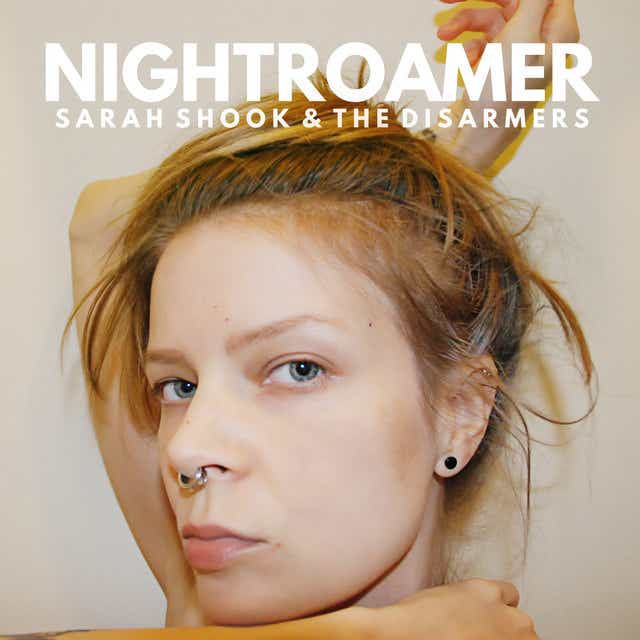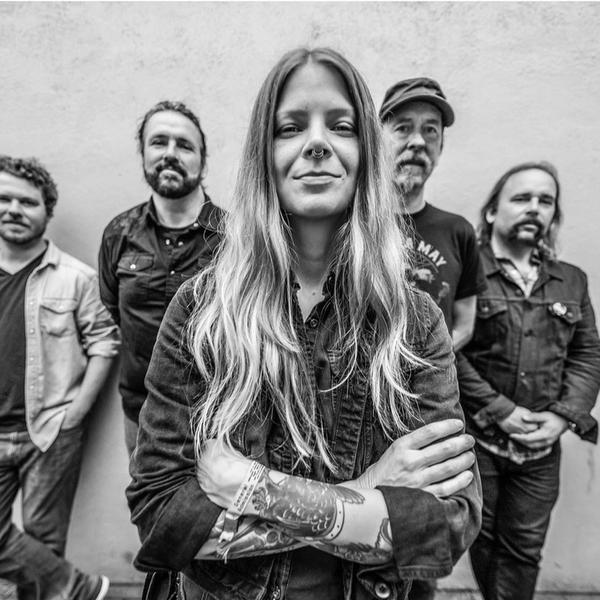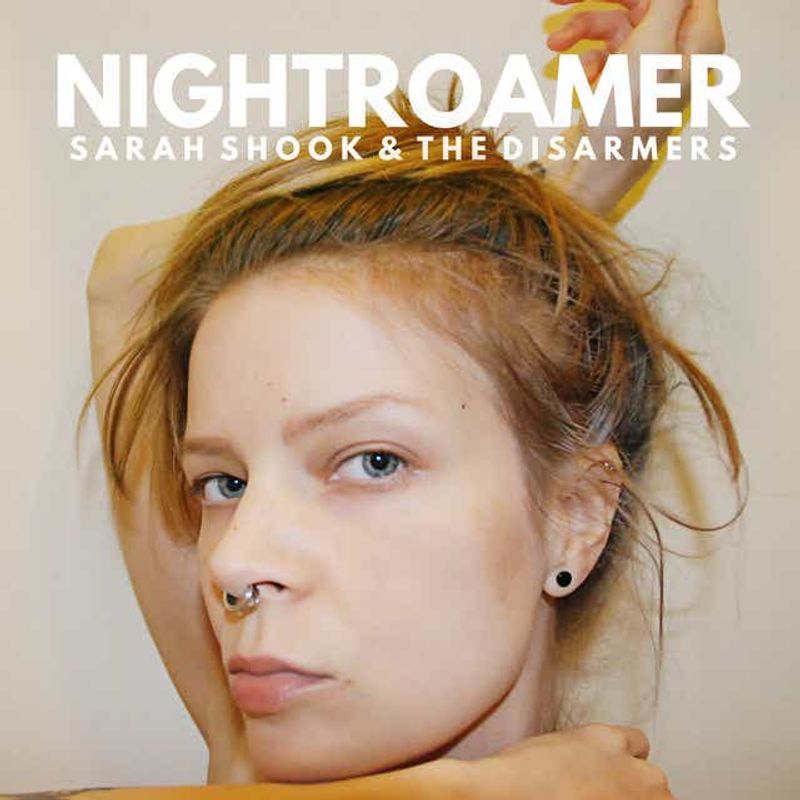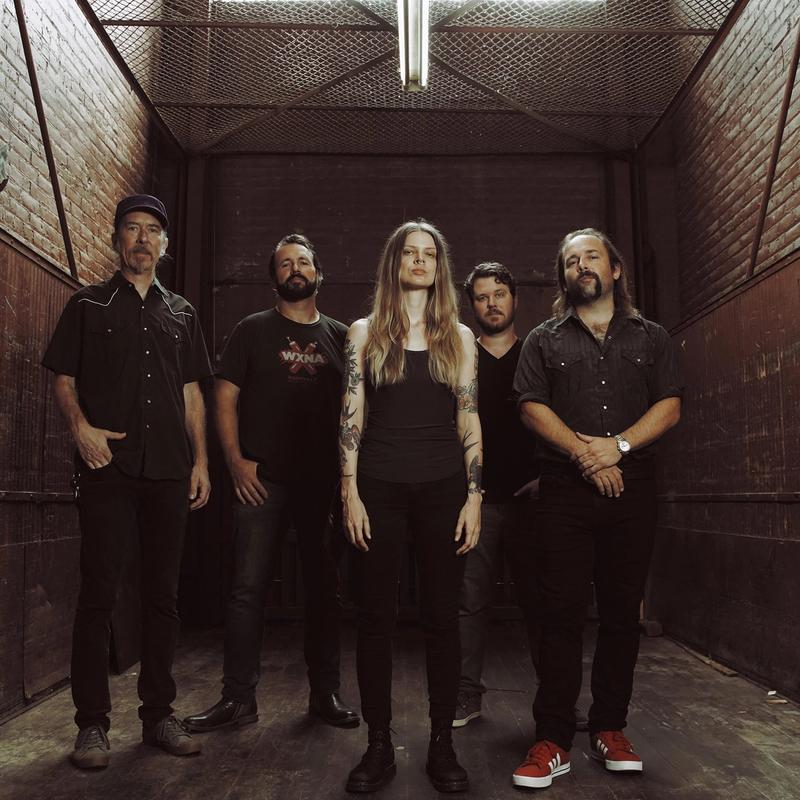
Abeyance / Thirty Tigers | 2022





Link copied

“I’m not afraid to go walking off into the night in some strange town,” says alt-country singer Sarah Shook, explaining the inspiration behind 'Nightroamer', the title track off their expansive new album. “I feel like it’s my right to do that. You know?”
Shook and their backing band, the Disarmers, bring this same fearless energy to their music. Their 2017 debut, Sidelong, is a queer country-punk classic, while its 2018 follow-up,Years, found the band polishing its sound without losing its edge. Nightroamer is their third studio album and first since leaving Bloodshot Records — the embattled Chicago indie label that Shook and others have accused of withholding royalties — for Thirty Tigers.
The album was produced by Pete Anderson, the prolific guitarist and producer best known for his work with Dwight Yoakam, and finds Shook and the Disarmers flirting with a new sensibility. While the pedal steel-heavy romps ‘No Mistakes’ and ‘Please Be a Stranger’ wouldn’t be out of place on Years, ‘I Got This’, with its liberal autotune and unabashed pop hook, is unlike anything else they’ve recorded.
Shook sat down with Holler to discuss the inspiration behind their songs, the impact of sobriety on their art and how they ensure that people of marginalized identities feel welcome at their shows.

Abeyance / Thirty Tigers | 2022
Let’s talk about ‘Somebody Else’, the first song on the album. I love how it opens: “Empty promises are just dirty damn lies.” Where did that come from?
There's never just one person at fault in a relationship, but often there's a person who carries the lion's share of being aggressive, or abusive, or jealous or insecure. And people like that don't really have self-awareness. Their partner gets upset, and then they say, “I’m sorry, I’m never going to do that again.” And then they do it over and over and over. They’re creating this false expectation to get something that they want, which is for their partner to stay.
I had this moment where both sides of it hit me: It’s not just that it’s an empty promise. It’s categorically untrue. When you’ve heard promises from a partner, promising better treatment and not to be jealous or insecure or manipulative, you get stuck in this cycle. At some point, you have to wake up and be like, this is a lie.
It’s interesting that you say that, because on songs like ‘No Mistakes’, you seem to take on the opposite role, the person who’s promising to be better.
I definitely try to write from the other person's perspective sometimes. I guess it’s an exercise in empathy, because there's part of me that wants to understand why people do the things that they do. It's a fine line to pursue understanding and not excuse bad behavior.
‘Good as Gold’ from Years is written from the perspective of a former partner. I'm recognizing where he was at that point in his life, and I'm also kind of putting words into his mouth. He was very, very possessive of me. So for me to write a song from his point of view and be like, “I don't see you as a possession,” is a way to reframe the narrative and also offer a bit of hope.
I've been in a lot of relationships with really jealous and insecure people, and while I needed to get out of those relationships for myself and my own mental health and safety, those people are still people and they're out there living their lives. I know some of them are miserable, and they've always been miserable, but it’s like, there's hope! You don't have to be that person. Change is real. It happens.
What was it like working with producer Pete Anderson?
It was pretty cool. At the time I had a fair amount of anxiety over working with this older straight white dude and music industry guy that I didn't… You know, he’s a music industry guy. I didn’t know anything about him.
But he was great. He’s a really good listener, he asks a lot of questions and he's genuinely interested in what you have to say. We didn't agree on everything, but I feel like we've got a really good working relationship, and we also had a lot of fun.
You’ve talked about feeling estranged from some of the songs on your 2013 EP, Seven, which you wrote before you were sober. What is your relationship like to the songs on Sidelong?
I love them. One of the things that I got asked a lot when I announced that I was sober was, are you just not going to do the old stuff anymore? What about ‘Fuck Up’? What about any of the songs that you've written about whiskey, of which there are many?
Recovery is different for everybody, and I'm sure that there are artists out there that get sober and it's just too triggering for them to talk about those things or sing about those things. Drinking was my life for years. It was a huge, huge part of my life. It was the coping mechanism that I chose for myself because I didn't know that there were healthier ways to deal with the stuff I was dealing with.
Do I regret being as hard as I was on my body with alcohol? Yes. But I also feel like alcohol was a really important part of my past. A lot of our fans drink, and anytime that I talk about sobriety or recovery from the stage, I make a point to say that I don't think everybody needs to quit drinking. I had a problem, and my physical and mental health were suffering because of the extent of the problem.
How has being sober changed your creative process?
It’s definitely taking some getting used to, to write songs without having a whiskey or two beforehand. That was actually one of my biggest fears with quitting drinking. I was like, am I ever going to be able to write a song again?
But I started writing songs when I was eight or nine and I reminded myself of that. And I was like, you've been writing songs without alcohol longer than you've been writing songs with alcohol. So even if you quit drinking and you go through six months and you don't write a single song, it's not necessarily the end of the world.
It’s been different. I think it's definitely improved and I feel like there's a lot more of a storytelling aspect to it. And it's interesting. I feel like I'm observing it myself. The longer I go through recovery, it's like watching myself grow, not just as a person but also as a writer. It's pretty cool.

Credit: Chad Cochran
You tweeted recently about consciously driving racists out of your fan base. Do you think that there are other artists that see that problem that don't necessarily do anything about it?
Absolutely. I think there are a lot of white country artists who are afraid of alienating people, they're afraid of potentially losing sales, they're afraid of people not showing up or buying tickets to their live shows. And I think that there are some artists that just don't care, and to them a buck is a buck and it doesn't matter if it comes from a Bernie supporter or a raging conservative evangelical Christian.
To me, the main reason it matters is because every time I play a show, I want to make sure that I've done everything that I can do to make sure that that room is a safe place. If you are a racist asshole or a fascist or a homophobe, you are the person who's going to feel unsafe at my show. Not the other way around.
I think that that's especially important in the last few years, where we've seen this huge rise of people having no shame in making extremely racist and homophobic public displays. Letting people know what is expected at shows is really important as far as keeping people safe and letting fans feel relaxed and not have to be looking over their shoulder like, “Am I going to get punched because this person doesn't like the way I look?”
Have you ever witnessed that kind of behavior at your own shows?
I haven’t seen it at my shows, but I've been with friends in public when someone decided that they didn't like the fact that they couldn't determine what this person's gender was and picked a fight with them. It's ridiculous. You don't owe anybody anything, especially not a stranger at a bar.
I've seen pictures of my friends that are like, “Yep. This is me with a busted lip because this dude on the bus didn't like the fact that I was wearing a skirt.” People have a lot of hatred and fear because they've been taught that there's only one way to be a person. As we know, that’s just too limited a view of the world, and of course it causes problems.
How do you make space for other marginalized artists?
I'm still learning about striking the balance. I run our social media accounts, and I have to consider the fact that it is a business. There's the business part of it, where you're relaying show information or how to pre-order an album, or something like that. So far, it's been pretty simple to just weave in posts here and there where you are promoting music from other artists. I think it’s a really important step that anybody can take to be more inclusive.
---
Sarah Shook & The Disarmers' new album, Nightroamer, is out on February 18th via Thirty Tigers. You can purchase the record from Holler's selected partners below:

Abeyance / Thirty Tigers | 2022
Items featured on Holler are first selected by our editorial team and then made available to buy. When you buy something through our retail links, we may earn an affiliate commission.,
Header photo by Harvey Robinson
